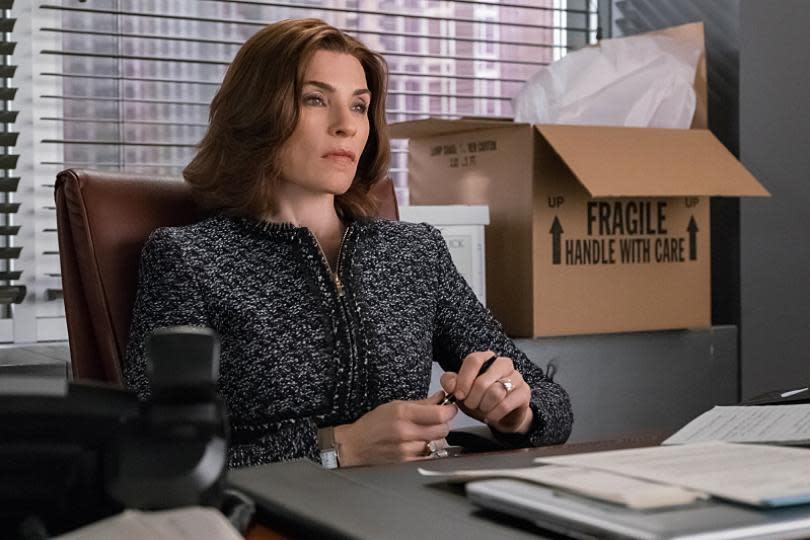‘The Good Wife’ Finale Review: Will Alicia Ever Be Happy?

The seventh and final season of The Good Wife concluded on Sunday night with an hour written by series creators Robert and Michelle King that brought some resolution and left other questions dangling — in other words, it was an episode in keeping with the complex nature of this generally excellent series. WARNING: MAJOR SPOILERS FOLLOW FOR THE SERIES FINALE OF THE GOOD WIFE.
Most of the final hour was all about Peter’s case — Would he be found guilty? Would he accept a plea? Would Alicia stand by him no matter what happened? — which in itself was disappointing. As much as I’ve always admired Chris Noth’s performance, shifting so much of the dramatic weight to Peter — to the point of even making Peter’s job as governor a possible future goal of Alicia’s — really felt off-key for a series composed as an anthem to a woman’s liberation. By the end, I couldn’t care less about the details of that case; it felt like the sort of puzzle-pieced, legal-jargoned, district-attorney-shenanigans case that The Good Wife in earlier seasons would have pinned on a guest star defendant and wrapped up in a single episode. Instead, this plot was forced to bear the weight of nearly everything: Peter’s future and, therefore, Alicia’s future; Diane Lockhart’s future and the future of every major player on camera this night. The hour felt claustrophobic and hemmed-in when it should have opened out and cleared space for us to fully enjoy and appreciate the changes in Alicia Florrick over the years.
To be sure, the Kings’ script gave us the creators’ version of that change in Alicia, from the Good Wife pilot episode to the finale. The pilot showed Alicia standing by Peter at a press conference, to all appearances a “good wife” who, once out of sight of the media, slapped her philandering husband. The finale showed Alicia standing by Peter at a press conference, to all appearances a “good wife” who probably has every intention of avoiding her husband in the future, a decision that was sharply interrupted by a different slap: Alicia getting pasted by Diane, who’d been thoroughly betrayed by Alicia.
All praise and respect to Christine Baranski for her performance here and throughout the series and to the Kings for giving her such a terrific final showcase. And yet, the one thing that was made most definitely clear — that Alicia and Diane will never be friends and colleagues again — was disappointing and disturbing. I’m reasonably sure the Kings didn’t intend it this way, but it certainly struck me that this series, which prized feminist ideals, concluded with Alicia and Diane as enemies and in pain over the men in their lives rather than the independent female agents The Good Wife had spent years developing.
The initial surprise of the finale was the return of Josh Charles as the Ghost of Will, or the Will of Alicia’s Dreams. In the end, Will was the great love of Alicia’s life — “I’ll love you forever,” she says to him in her imagining of him — even as he encourages her to feel free to pursue Jason. Alicia’s proclamation of love, along with Will’s ultra-Will wry response (“I’m OK with that”), was beautifully presented. But it did not lead to the kind of resolution Will or Alicia or Jason or perhaps the viewing audience wanted.
Robert King’s direction of the finale built to three choices for Alicia, three different answers to the question, Who do you want to come home to? Would it be Peter, his tall bulk at once solid and all too weighty; or Jason, so airy he may flit off to another continent if the spirit moves him; or Will — i.e., living in regret of something that never happened?
When you think about them, these were all pretty grim alternatives. And after being slapped by Diane for betraying her in a “zealous defense” courtroom strategy, Alicia pulled herself together, dried the tears from a momentary, stinging pain, straightened her jacket, and put on a grim face to move forward into her new life and out of ours. I’m glad Alicia became so strong over the course of The Good Wife; I’m sad that it all had to end so grimly.

